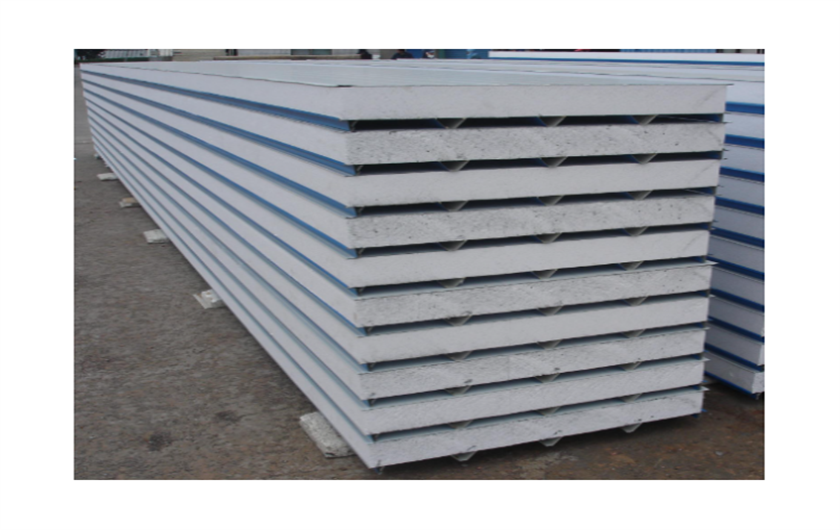Шумдук булгандыктан, күнүмдүк жашоону бузуп, комфортту жана өндүрүмдүүлүктү таасирлейт. Изоляцияланган чатыр панелдери бул маселени чечүүнүн натыйжалуу жолу болуп саналат. Бул панелдер үн толкундарын сиңирүү жана тышкы тоскоолдуктарды тосуу аркылуу шумдукту азайтат. Алар сизди сырттагы каосдон коргоп, тынч ички чөйрөнү түзөт. Өзүнүн үн өткөрбөйт жана үн сиңирүү касиеттери менен изоляцияланган чатыр панелдери сиздин мейкиндигиңиздин акустикасын жакшыртат. Эгер сиз жандуу шаарда же ызы-чуулуу өнөр жай аймактарында жашасаңыз, бул панелдер сизге тынч, көбүрөөк комфорттуу атмосфераны ырахаттанууга жардам берет.
Имараттардагы шумдук булгануунун маселеси
Шумдук булганууну жана анын булактарын түшүнүү
Шумдук булган булбаштар сиздин күнүмдүк жашооңузду бузган же ашыкча үндөрдү билдирет. Ал көбүнчө транспорттон, курулуштан, өнөр жай ишмердүүлүктөрдөн же 심е даусунан келип чыгат. Шаардык аймактарда унаалар жана коомдук транспорт көйгөйгө олуттуу салым кошот. Өнөр жай аймактарында машиналар жана жабдуулар туруктуу шумдукту жаратышат. Турак жайларында болсо, иттердин үргөнү же катуу музыка ызы-чууну жаратышы мүмкүн. Бул үндөр дубалдар, терезелер жана чатырлар аркылуу өтүп, сиздин ички мейкиндиктериңизге кирет. Бул булактарды түшүнүү, сиздин айланаңыздагы шумдук булгануунун негизги себептерин аныктоого жардам берет.
Шумдук булгануунун ден соолукка, ыңгайлуулукка жана өндүрүмдүүлүккө тийгизген таасирлери
Шумдук булган булгандыктан, ал сизди гана тынчсыздандырбайт. Ал сиздин ден соолугуңузга, комфорттугуңузга жана көңүл бурууга таасир этет. Узак убакыт бою катуу үндөргө дуушар болуу стресске, уйку бузулууларына жана даже угуу жоготуусуна алып келиши мүмкүн. Ал үйдө эс алууңузду бузуп, жумушта көңүл бурууну кыйындатат. Студенттер үчүн шумдук үйрөнүүгө жана сактоого тоскоол болушу мүмкүн. Жумушчу жайларда туруктуу шумдук өндүрүмдүүлүктү төмөндөтүп, каталарды көбөйтөт. Убакыттын өтүшү менен, бул таасирлер сиздин жалпы жашоо сапатыңызды төмөндөтөт. Шумдук булганышын чечүү сиздин ден соолугуңузду коргоо жана тынч чөйрөнү сактоо үчүн маанилүү.
Неге шумдук булганышын чечүү заманбап имараттар үчүн маанилүү
Заманауи имараттар шудун булгануусун жоюу боюнча чечимдерди биринчи орунга коюшу керек. Шаарлар өскөн сайын, шудун деңгээли жогорулап, тынч жайларды табуу кыйын болуп жатат. Изоляцияланган чатыр панелдери имаратыңызга кирген шуду азайтуунун натыйжалуу жолу болуп саналат. Алар тышкы үндөрдү тосуп, ички акустиканы жакшыртат, бул болсо ыңгайлуу атмосфераны түзөт. Шудун булгануусун чечүү менен, сиздин мейкиндигиңиздин функционалдуулугун жогорулатасыз. Бул үйбүлө, офис же өнөр жай объектиси болобу, шуду азайтуу жакшы жашоо жана иштөө шарттарын камсыз кылат. Заманауи имараттар ден соолукка, көңүл бурууга жана эс алууга жардам берген чөйрөлөрдү камсыз кылууга умтулушу керек.
Изоляцияланган чатыр панелдери шуду азайтууда кандайча иштейт
Материалдык курамы жана шуду жоюу мүмкүнчүлүктөрү
Изоляторлуу чатыр панелдери үндү блоктоо жана азайтуу үчүн өнүккөн материалдарды колдонушат. Бул панелдер көп катмардан турат, анын ичинде полиуретан же полистирол сыяктуу тыгыз ядро материалдары бар. Тыгызыраак ядро үн толкундарын чатыр структурасынан өтүүгө тоскоолдук кылган тосмо катары иштейт. Сырткы катмарлар, адатта металл же башка бышык материалдардан жасалган, кошумча күч кошуп, үн өткөрбөө эффектин жакшыртат. Бул материалдардын айкалышы тышкы үндөр, мисалы, транспорт же механизмдер, имаратыңыздан тышкары калуусун камсыз кылат. Изоляторлуу чатыр панелдерин тандап, сиз каалабаган үндөрдү минималдаштырууга ишенимдүү чечим аласыз.
Үндү жутуу касиеттери жана алардын үн азайтуудагы ролу
Изолятор менен жабылган чатыр панелдеринин үндү жутуу касиеттери тынч жана тынч ички мейкиндиктерди түзүүдө маанилүү роль ойнойт. Бул панелдер үн толкундарын чагылдыруунун ордуна жутуп, имараттын ичинде эхо жана жаңгырыкты азайтат. Бул өзгөчөлүк, мисалы, офис, класстар же үйлөр сыяктуу так акустика маанилүү болгон мейкиндиктерде өзгөчө пайдалуу. Панелдердин ичиндеги негизги материал үн энергиясын кармап, анын андан ары жайылышына жол бербейт. Бул процесс сырттагы шуду бөгөттөп гана тим болбостон, ички чөйрөңүздүн жалпы акустикалык сапатын да жакшыртат. Изолятор менен жабылган чатыр панелдери менен сиз тынч жана тынч мейкиндикти ырахаттана аласыз.
Кошумча пайда: Термалдык изоляция жана энергияны үнөмдөө
Изоляторлуу чатыр панелдери үн азайтуудан тышкары көп нерсени сунуштайт. Алар ошондой эле термалык изоляцияны мыкты камсыз кылат, сизге ыңгайлуу ички температураны сактоого жардам берет. Үндү бөгөттөгөн ошол эле тыгыз ядро материалы жылуулук өткөрүлүшүн алдын алат, имаратыңызды кышында жылуу, жайында болсо салкын кармап турат. Бул эки функция жылуулук жана муздатуу системаларына болгон көз карашыңызды азайтып, энергия чыгымдарыңызды төмөндөтөт. Мындан тышкары, бул панелдердин энергияны үнөмдөөчү өзгөчөлүгү туруктуу имараттын дизайнына салым кошот. Изоляторлуу чатыр панелдерин орнотуу менен сиз үн булгануусун азайтып гана тим болбостон, энергияны үнөмдөгөн жана экологиялык жактан таза мейкиндикти да түзөсүз.
Изоляторлуу чатыр панелдеринин үн азайтуудагы пайдасы
Турмуштук мейкиндиктерде жакшыртылган ыңгайлуулук жана жеке жашоо
Изоляторлуу чатыр панелдер тынч жана жеке үй чөйрөсүн түзөт. Алар сырттан келген үндөрдү, мисалы, транспорт же ызы-чууланган коңшуларды, жашоо мейкиндигиңизге киргизбейт. Бул үн изоляциялоо функциясы сизге үзгүлтүксүз тоскоолдуктарсыз эс алууга мүмкүндүк берет. Панелдер ошондой эле ички акустиканы жакшыртат, сүйлөшүүлөрдү жана көңүл ачуу системаларын так угууга жардам берет. Үндү азайтуу менен, алар сизге тынч атмосфераны ырахаттанууга жардам берет, сиз үй-бүлөңүз менен убакыт өткөрүп жатсаңыз же узак күндөн кийин эс алып жатсаңыз. Бул панелдер үйүңүздүн ыңгайлуулугун жогорулатат, ошол эле учурда жеке жашооңуздун сакталуусун камсыз кылат.
Коммерциялык имараттарда жакшыртылган көңүл буруу жана өндүрүмдүүлүк
Шум жумуш ордунда көңүл бурууга таасир этет. Изоляцияланган чатыр панелдери курулуш же көчөдөгү шум сыяктуу тышкы үндөрдү минималдаштыруу менен алаканы азайтат. Бул кызматкерлердин үзгүлтүксүз тапшырмаларына көңүл бурууга мүмкүнчүлүк берген тынч чөйрөнү түзөт. Жакшыртылган акустика жыйындарда же презентацияларда байланыштарды жакшыртат. Мектептерде бул панелдер студенттердин фондук шумду азайтуу менен жакшыраак көңүл буруусуна жардам берет. Изоляцияланган чатыр панелдерин орнотуу менен сиз билим алуу жана кесиптик өсүүнү колдогон натыйжалуу мейкиндикти түзөсүз.
Шумду контролдоо жана өнөр жай чөйрөлөрүндөгү коопсуздук
Өнөр жай объектилери көбүнчө машиналардан жана жабдыктардан жогорку үн деңгээлдерине дуушар болушат. Изоляцияланган чатыр панелдери бул үндү контролдоого жардам берет, жумушчуларды угуу зыяндарынан коргойт жана стрессти азайтат. Тынч жумуш чөйрөсү кызматкерлерге маанилүү сигналдарды же сигналдарды угууга мүмкүндүк берип, коопсуздукту жакшыртат. Бул панелдер команданын мүчөлөрү ортосундагы байланыштарды да жакшыртат, операцияларды жеңилдетет. Үн булгануусун азайтуу менен, изоляцияланган чатыр панелдери коопсуз жана натыйжалуу өнөр жай жумуш ордуна салым кошот.
Энергия натыйжалуулугу аркылуу узак мөөнөттүү чыгымдарды үнөмдөө
Изоляцияланган чатыр панелдери үндү азайтуу менен бирге, узак мөөнөттө акчаңызды үнөмдөөгө жардам берет. Алардын термалык изоляциялык касиеттери жылуулук өткөрүүнү минималдаштырат, имаратыңызды кышында жылуу, жайында болсо салкын кармап турат. Бул жылуулук жана муздатуу системаларынын күчтүү иштеши үчүн муктаждыгын азайтат, бул болсо энергияны колдонууңузду төмөндөтөт. Убакыттын өтүшү менен, коммуналдык төлөмдөрүңүздө маанилүү төмөндөөнү байкайсыз.
Бул панелдердин энергияны үнөмдөөчү өзгөчөлүктөрү HVAC системаларыңыздын кызмат мөөнөтүн узартат. Жылуулук жана муздатуу бирдиктери азча иштесе, алар аз кийим-кечек кийишет. Бул аз оңдоолорду жана алмаштырууларды билдирет, жылдар бою кошумча чыгымдарды үнөмдөйт. Изоляторлуу чатыр панелдерине инвестиция салуу менен, сиз бюджетти коргойсуз жана ыңгайлуу ички чөйрөнү сактайсыз.
Мындан тышкары, энергияны үнөмдөөчү имараттар көп аймактарда салык жеңилдиктерине же кайтарымдарга ээ болушу мүмкүн. Өкмөттөр жана уюмдар каржылык пайда сунуштоо менен туруктуу курулуш практикаларын колдошот. Изоляторлуу чатыр панелдерин орнотуу, мүлкүңүздү бул программаларга ылайыктуу кылып, дагы да көп үнөмдөөгө мүмкүнчүлүк берет.
Энергияны үнөмдөө боюнча изилдөөлөргө ылайык, туура изоляцияланган имараттар энергия чыгымдарын 30% га чейин азайта алат. Бул изоляторлуу чатыр панелдерин турак жай жана коммерциялык мүлктөр үчүн акылдуу тандоо кылат.
Узак мөөнөттүү келечекте, бул панелдер туруктуу келечекке салым кошот. Энергияны аз пайдалануу сиздин көмүртек изиңизди азайтат, имаратыңызды экологиялык жактан таза практикалар менен шайкеш келтирет. Изоляцияланган чатыр панелдерин тандап, сиз акча үнөмдөп гана тим болбостон, ошондой эле экологияны коргоону колдойсуз.
Изоляцияланган чатыр панелдеринин колдонулушу
Турак жай имараттары: Үйлөр, батирлер жана кондоминиумдар
Изоляцияланган чатыр панелдери турак жай мүлктөрү үчүн маанилүү пайда алып келет. Алар сизге тышкы шуду тосуп, тынч үй түзүүгө жардам берет, мисалы, транспорт, ызы-чуулук кылган коңшулар же курулуш үндөрү. Бул үндү тосуп алуу функциясы тынч чөйрөнү камсыз кылат, сизге эс алууга жана жеке мейкиндигиңизден ырахат алууга мүмкүнчүлүк берет, үзгүлтүксүз тоскоолдуктарсыз.
Шумду азайтуудан тышкары, бул панелдер үйүңүздүн энергия натыйжалуулугун жакшыртат. Алар туруктуу ички температураны сактап, ашыкча жылытуу же муздатуу зарылдыгын азайтат. Бул сиздин энергия чыгымдарыңызды төмөндөтүп гана тим болбостон, үйүңүздү экологиялык жактан таза кылат. Сиз бир үй-бүлөлүк үйдө, батирде же кондо да жашасаңыз, изоляцияланган чатыр панелдери жашоо тажрыйбаңызды жакшыртып, комфорт, жеке жашоо жана чыгымдарды үнөмдөөгө жардам берет.
Коммерциялык жайлар: Офистер, мектептер жана медициналык мекемелер
Коммерциялык имараттар изоляцияланган чатыр панелдерин орнотуудан чоң пайда алышат. Офистерде, бул панелдер тышкы шумдан улам келип чыккан алаканы азайтат, мисалы, көчө трафиги же жакынкы курулуш. Тынч жумушчу чөйрө кызматкерлердин көңүлүн жакшыраак бурууга жардам берет, өндүрүмдүүлүктү жогорулатат жана жалпы жумуш канааттануусун жакшыртат.
Мектептерде, үндү азайтуу эффективдүү окуу чөйрөсүн түзүүдө маанилүү роль ойнойт. Изоляцияланган чатыр панелдери фондук үндөрдү минималдаштырат, студенттерге сабактарга көңүл бурууга жана мугалимдерге натыйжалуу байланышууга мүмкүнчүлүк берет. Бул жакшы академиялык натыйжаларга жана кызыктуу класстагы тажрыйбага алып келет.
Саламаттыкты сактоо мекемелери да бейтаптардын калыбына келүүсүн жана жакшы жашоосун камсыз кылуу үчүн тынч чөйрөлөрдү талап кылат. Изоляцияланган чатыр панелдери бузгуч үндөрдү тосуп, бейтаптар жана кызматкерлер үчүн тынч атмосфераны камсыз кылат. Аккустиканы жакшыртуу жана үн булгануусун азайтуу аркылуу, бул панелдер коммерциялык жайлардын функционалдуулугуна жана ыңгайлуулугуна салым кошот.
Өнөр жай мекемелери: Заводдор, складдар жана цехтер
Өнөр жай чөйрөлөр көбүнчө машиналардан, жабдыктардан жана операциялардан жогорку деңгээлдеги шудуктан жабыркайт. Изоляцияланган чатыр панелдери бул шудукту натыйжалуу башкарууга жардам берет, коопсуз жана ыңгайлуу жумуш ордун түзөт. Шудук деңгээлин төмөндөтүү менен, бул панелдер жумушчуларды угуу зыяндарынан коргойт жана дайыма жогорку үндөрдөн келип чыккан стрессти төмөндөтөт.
Шудук контролунун жакшыртылышы команданын мүчөлөрү арасында байланыштын жакшыртылышына да жардам берет, операцияларды жеңилдетип, коопсуздукту жогорулатат. Жумушчулар маанилүү сигналдарды, сигнализацияларды же көрсөтмөлөрдү так угушат, бул кырсыктарды болтурбоо мүмкүнчүлүгүн төмөндөтөт. Мындан тышкары, изоляцияланган чатыр панелдери өнөр жай объектилеринде энергияны үнөмдөөгө салым кошот. Алар ички температураны жөнгө салууга жардам берет, жылуулук жана муздатуу системаларына болгон жүктөмдү азайтып, энергия чыгымдарын төмөндөтөт.
Сиз фабрика, склад же цех иштетип жатсаңыз, изоляцияланган чатыр панелдери үн контролдоо, коопсуздук жана энергияны үнөмдөө үчүн практикалык чечимдерди сунуштайт. Бул панелдер жалпы иштөө шарттарын жакшыртат, сиздин өнөр жай объектинерди эффективдүү жана жумушчулар үчүн ыңгайлуу кылат.
Орнотуу жана тейлөө боюнча кеңештер
Сиздин муктаждыктарыңыз үчүн туура изоляцияланган чатыр панелдерин тандоо
Туура изоляцияланган чатыр панелдерин тандоо үн азайтуу жана энергиянын натыйжалуулугун камсыз кылуу үчүн эң жакшы натыйжаларды алууга жардам берет. Сиздин имаратыңыздын конкреттүү талаптарын баалоодон баштаңыз. Сиздин аймактагы үн булгануу деңгээлин, имараттын түрүн жана бюджетти эске алыңыз. Турак жайлар үчүн, күчтүү үн өткөрбөө жана жылуулук изоляциясы касиеттери бар панелдерге артыкчылык бериңиз. Өнөр жай же коммерциялык шарттарда, жогору үн деңгээлдерин көтөрүүгө жана туруктуулукту камсыз кылууга арналган панелдерди издеңиз.
Панелдердин негизги материалына көңүл буруңуз. Полиизол жана полистирол сыяктуу материалдар мыкты үн изоляциясын жана жылуулук изоляциясын сунуштайт. Панелдердин калыңдыгын да текшериңиз. Калың панелдер адатта үн азайтууда жакшыраак натыйжа берет. Панелдердин акустикалык рейтингдерин түшүнүү үчүн өндүрүүчүлөр же жеткирүүчүлөр менен кеңешиңиз. Алардын натыйжасын текшерүү үчүн сертификаттарды же тест натыйжаларын издеңиз.
Pro Tip: Ар дайым жергиликтүү курулуш коддоруна жана эрежелерине жооп берген панелдерди тандаңыз. Бул коопсуздукту жана талаптарды аткарууну камсыз кылат, инвестицияңыздын пайдасын максималдуу кылат.
Үн азайтууну максималдуу кылуу үчүн орнотуу боюнча мыкты практикалар
Туура орнотуу изоляцияланган чатыр панелдеринин натыйжалуулугунда маанилүү роль ойнойт. Бул панелдерди орнотууга адистешкен тажрыйбалуу адистерди жалдоодон баштаңыз. Кесипкөй орнотуучулар панелдердин бекем отурушуна жана пландагандай иштешине кепилдик беришет. Орнотуудан мурун, чатырдын структурасын зыян же алсыз жерлер үчүн текшериңиз. Бул маселелерди алдын ала оңдоо келечектеги кыйынчылыктарды алдын алат.
Орнотуу учурунда панелдердин ортосунда эч кандай боштуктар жок экенине ишеніңіз. Кичинекей боштуктар да үн өтүшүнө мүмкүндүк берет, бул панелдердин натыйжалуулугун төмөндөтөт. Ар кандай seams же joints үчүн жогорку сапаттагы герметиктерди колдонуңуз. Бул үн өткөрбөй турган тосмо түзөт, бул үн өткөрбөй турган жана жылуулук изоляциясын жакшыртат.
Панелдерди имараттын дизайнына туура жайгаштырыңыз. Орнотуу жана бекитүү үчүн өндүрүүчүнүн көрсөтмөлөрүн аткарыңыз. Туура эмес жайгаштыруу панелдердин натыйжалуулугун бузушу мүмкүн. Эгер имаратыңызда skylights же vents сыяктуу кошумча өзгөчөлүктөр болсо, алардын үн өтпөй тургандыгын камсыз кылуу үчүн туура жабылганына ишеніңіз.
Кесиптик кеңеш: Изоляцияланган чатыр панелдерин максималдуу үн азайтуу үчүн акустикалык дубал панелдери же эки катмарлуу терезелер сыяктуу башка үн өткөрбөйт турган чаралар менен бириктириңиз.
Узак мөөнөттүү иштешин камсыз кылуу үчүн тейлөө стратегиялары
Түзүлгөн чатыр панелдериңизди жылдар бою натыйжалуу иштетүү үчүн туруктуу тейлөө жүргүзүңүз. Панелдерди мезгил-мезгили менен кийимдердин же зыяндардын белгилерин текшерүү менен баштаңыз. Алардын үн өткөрбөйт турган мүмкүнчүлүктөрүнө таасир эте турган жарыктар, чукулдар же боштуктарды издеңиз. Кенемелерди дароо чечип, андан ары начарлоосун алдын алыңыз.
Панелдерди убакыттын өтүшү менен топтолгон кир, калдыктар же көгөрүү үчүн тазалаңыз. Бетин зыян келтирбөө үчүн абразивдик эмес тазалоо чечимдерин жана жумшак щеткаларды колдонуңуз. Панелдерди таза кармоо алардын көрүнүшүн жана иштешин сактоого жардам берет.
Мөөрлөрдү жана бекиткичтерди мезгил-мезгили менен текшериңиз. Убакыттын өтүшү менен, мөөрлөр начарлап, бекиткичтер аба ырайынын шарттары же структуралык кыймылдардан улам бошонуп кетиши мүмкүн. Эскирген мөөрлөрдү алмаштырып, бош бекиткичтерди катып, бекем отурууну камсыз кылыңыз.
Эгер панелдериңиз металл сырткы бетин камтыса, коррозия же ржавчина үчүн текшериңиз. Алардын кызмат мөөнөтүн узартуу үчүн коргоочу каптоолорду колдонуу керек.
Кесиптик кеңеш: Панелдериңиздин жогорку абалда болушун камсыз кылуу үчүн ар бир бир нече жылда профессионалдык текшерүүлөрдү пландаштырыңыз. Адистер мүмкүн болгон маселелерди аныктап, алар чоң көйгөйгө айланбай туруп чечимдерди сунуштай алышат.
Туура панелдерди тандап, мыкты орнотуу практикаларын карманып, аларды үзгүлтүксүз тейлөө менен, сиз изоляцияланган чатыр панелдеринин бардык артыкчылыктарынан ырахат ала аласыз. Бул кадамдар сиздин имаратыңызды жылуу, ыңгайлуу жана энергияны үнөмдөөчү кылып, жылдар бою сактоого жардам берет.
Изоляцияланган чатыр панелдери имараттарда шуду шумун азайтуунун мыкты жолу болуп саналат. Алар тышкы үндөрдү тосуп, ички акустиканы жакшыртат, тынч жана ыңгайлуу чөйрө түзөт. Бул панелдер ошондой эле жылуулук изоляциясын сунуштайт, энергияны үнөмдөп, ички температураны туруктуу сактоого жардам берет. Алардын орнотуусу менен имараттын функционалдуулугун жана баасын жогорулатасыз. Жеке, коммерциялык же өнөр жай колдонуу үчүн болобу, алар узак мөөнөттүү пайда алып келет. Изоляцияланган чатыр панелдерин тандоо тынч, энергияны үнөмдөгөн мейкиндикти камсыз кылат, бул сиздин ден соолук жана өндүрүмдүүлүгүңүздү колдойт.

 EN
EN







































